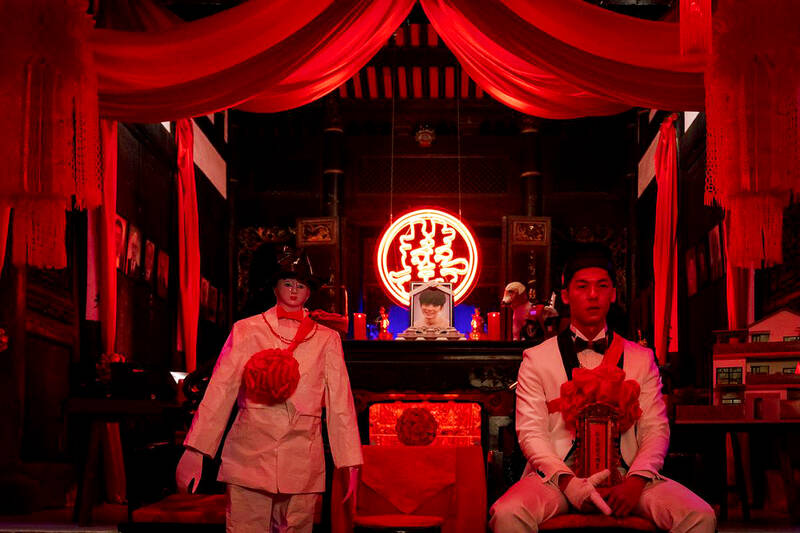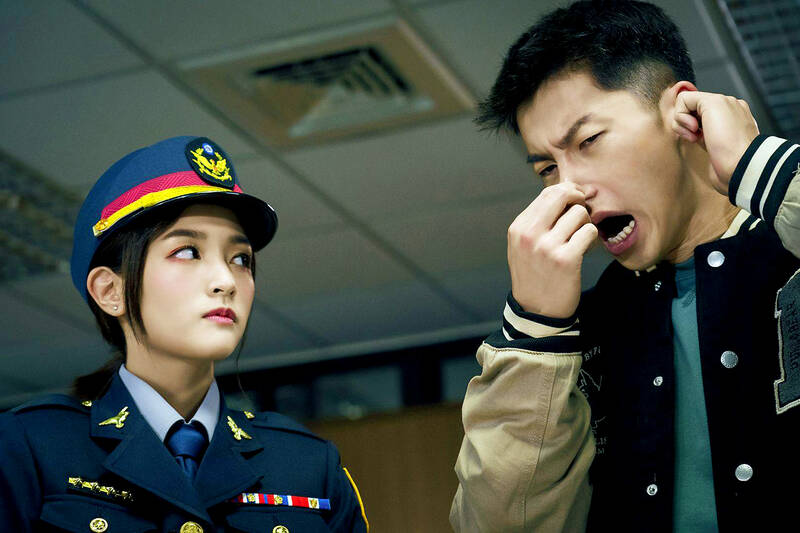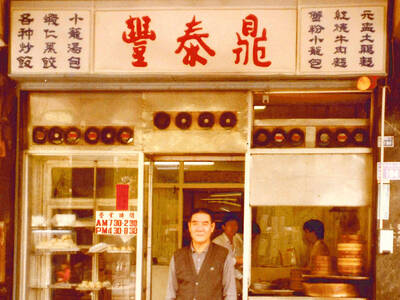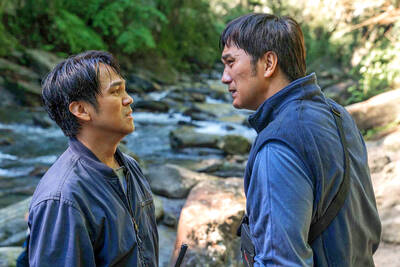It’s pretty predictable what will happen when egotistical, homophobic cop Ming-han (Greg Hsu, 許光漢) is coerced into marrying the ghost of recently deceased gay man Mao Mao (Austin Lin, 林柏宏).
While retrieving evidence a drug dealer threw out the window during an over-the-top car chase, Ming-han accidentally picks up a red envelope planted by Mao Mao’s grandmother, who hopes to find her grandson a husband in the afterlife. Ming-han does not believe in this folk practice, but after a series of mishaps befalls him that same afternoon, he reluctantly agrees to the ghost wedding and becomes the only person who can see Mao Mao’s spirit.
Based on Lai Chih-liang’s (賴致良) script, which won Best Creative Story in 2018’s Let’s Be Wild (野草計畫) screenwriting contest, the film presents an intriguing concept as both ghost weddings and gay weddings are frowned upon in society.

Photo courtesy of Calendar Studios
Anyhow, forced to spend every waking minute together, Ming-han eventually changes his views, becomes a better person and saves the day.
Sure, it’s formulaic, mainstream stuff, albeit with a uniquely Taiwanese twist, but that doesn’t mean that Marry My Dead Body (關於我和鬼變成家人的那件事) isn’t entertaining. Having delivered blockbusters such as The Tag-Along (紅衣小女孩) and The Soul (魂), director Cheng Wei-hao (程偉豪) appears to have mastered the art of making solid, commercially successful supernatural thrillers. Now he adds comedy to his resume.
The chemistry between Ming-han and Mao Mao, who angrily call each other “damned gay” and “dumb straight guy” at first, is quite warm and builds naturally. They both harbor stereotypical beliefs about people of each other’s sexual orientation, and the scenes of their daily interaction and eventual mutual understanding, while cheesy at points, are hilarious and poignant.

Photo courtesy of Calendar Studios
There’s quite a lot going on in the film, which is mainly driven by Ming-han’s attempts to catch notorious drug dealer Brother Hsiao (Tsai Chen-nan, 蔡振南) and redeem his career, while trying to help Mao Mao fulfill his lingering wishes so he can leave this world without regrets. Mao Mao promises to use his spiritual powers to help Ming-han with his tasks, but his attempts often go unexpectedly awry. Of course, the recipe always calls for a twist or two to the mystery, and despite knowing so, it was still fun and effective.
Gingle Wang (王淨) plays Ming-han’s love interest and work partner Tzu-ching, who despite being a side character, pulls her weight and allows for further examination of gender stereotypes and expectations. She tries to prove herself as a competent cop and not just a pretty face for promotional and ceremonial purposes, but some coworkers still spread rumors that she slept her way to the top.
Chosen as the closer for last year’s Golden Horse Film Festival, Marry My Dead Body is more than just a silly action-comedy; it showcases various traditional and modern Taiwanese cultural phenomena and touches upon issues ranging from same-sex marriage to environmental awareness. The film’s commercial style allows for these topics to reach a larger audience in a non-preachy, light-hearted manner, as it garnered NT$47 million in box office sales in just its first three days in theaters.
For example, Mao Mao is an active proponent of bringing one’s own containers and bags to take out restaurants, and his first request to Ming-han is to “stop global warming.” His endearing grandmother (Wang Man-Chiao, 王滿嬌) is a vocal supporter of his sexual orientation, accompanying him to the pride parade, but his stern father (Tuo Tsung-hua, 庹宗華) cannot accept it.
These two characters are also portrayed well, and contribute to the depth of the movie. One of the film’s actors will probably win an award this year for their performance.

March 24 to March 30 When Yang Bing-yi (楊秉彝) needed a name for his new cooking oil shop in 1958, he first thought of honoring his previous employer, Heng Tai Fung (恆泰豐). The owner, Wang Yi-fu (王伊夫), had taken care of him over the previous 10 years, shortly after the native of Shanxi Province arrived in Taiwan in 1948 as a penniless 21 year old. His oil supplier was called Din Mei (鼎美), so he simply combined the names. Over the next decade, Yang and his wife Lai Pen-mei (賴盆妹) built up a booming business delivering oil to shops and

Indigenous Truku doctor Yuci (Bokeh Kosang), who resents his father for forcing him to learn their traditional way of life, clashes head to head in this film with his younger brother Siring (Umin Boya), who just wants to live off the land like his ancestors did. Hunter Brothers (獵人兄弟) opens with Yuci as the man of the hour as the village celebrates him getting into medical school, but then his father (Nolay Piho) wakes the brothers up in the middle of the night to go hunting. Siring is eager, but Yuci isn’t. Their mother (Ibix Buyang) begs her husband to let

The Taipei Times last week reported that the Control Yuan said it had been “left with no choice” but to ask the Constitutional Court to rule on the constitutionality of the central government budget, which left it without a budget. Lost in the outrage over the cuts to defense and to the Constitutional Court were the cuts to the Control Yuan, whose operating budget was slashed by 96 percent. It is unable even to pay its utility bills, and in the press conference it convened on the issue, said that its department directors were paying out of pocket for gasoline

On March 13 President William Lai (賴清德) gave a national security speech noting the 20th year since the passing of China’s Anti-Secession Law (反分裂國家法) in March 2005 that laid the legal groundwork for an invasion of Taiwan. That law, and other subsequent ones, are merely political theater created by the Chinese Communist Party (CCP) to have something to point to so they can claim “we have to do it, it is the law.” The president’s speech was somber and said: “By its actions, China already satisfies the definition of a ‘foreign hostile force’ as provided in the Anti-Infiltration Act, which unlike